
Leslie Kramer
Stanford University | Associate Director, Facilities Energy Management
Speaker
Track L: Community Energy Transitions
Session L2: Colleges & Universities Accelerating Community Energy Transitions
September 26, 2024 | 9:30 am - 10:00 am
Decarbonization At Stanford: What's The Plan?
Stanford University achieved several noteworthy decarbonization milestones in the last decade, including 100% renewable electricity supply, reducing Scope 1 and 2 emissions by 80%, and creating a pioneering program to address Scope 3 emissions. The biggest project has been the electrification of the Central Energy Facility (CEF) in 2015.
Building upon this success, Stanford is updating the University’s Climate Action Plan to meet our commitment to achieving net zero carbon emissions by 2050. The University is developing a strategy to eliminate its remaining Scope 1 emissions, 35% of which come from natural gas in buildings not served by the CEF and buildings served by the CEF and using gas for space heating, cooking, laundry, and process steam. Stanford would like to share how we are proceeding in this next phase of decarbonization.
For example, Stanford has tested de-gasifying multiple buildings. That experience pointed to the need for an editable carbon model for use in capital planning and budgeting. Stanford is developing a model to evaluate options for how and when to electrify buildings and estimate costs.
The campus is also developing plans for reductions in Scope 3 emissions. Multiple teams are working on reducing construction, renovation and operations related emissions.
Speaker Bio
Ms. Kramer manages Stanford’s Energy Engineering Services team. She supports decarbonization efforts through improving the energy efficiency of Stanford University buildings, focusing on large-scale building energy retrofits and controls upgrades and ongoing-commissioning projects. She has a B.A. degree in Engineering from Brown University and a M.A. degree in Energy and Resources from U.C. Berkeley.
